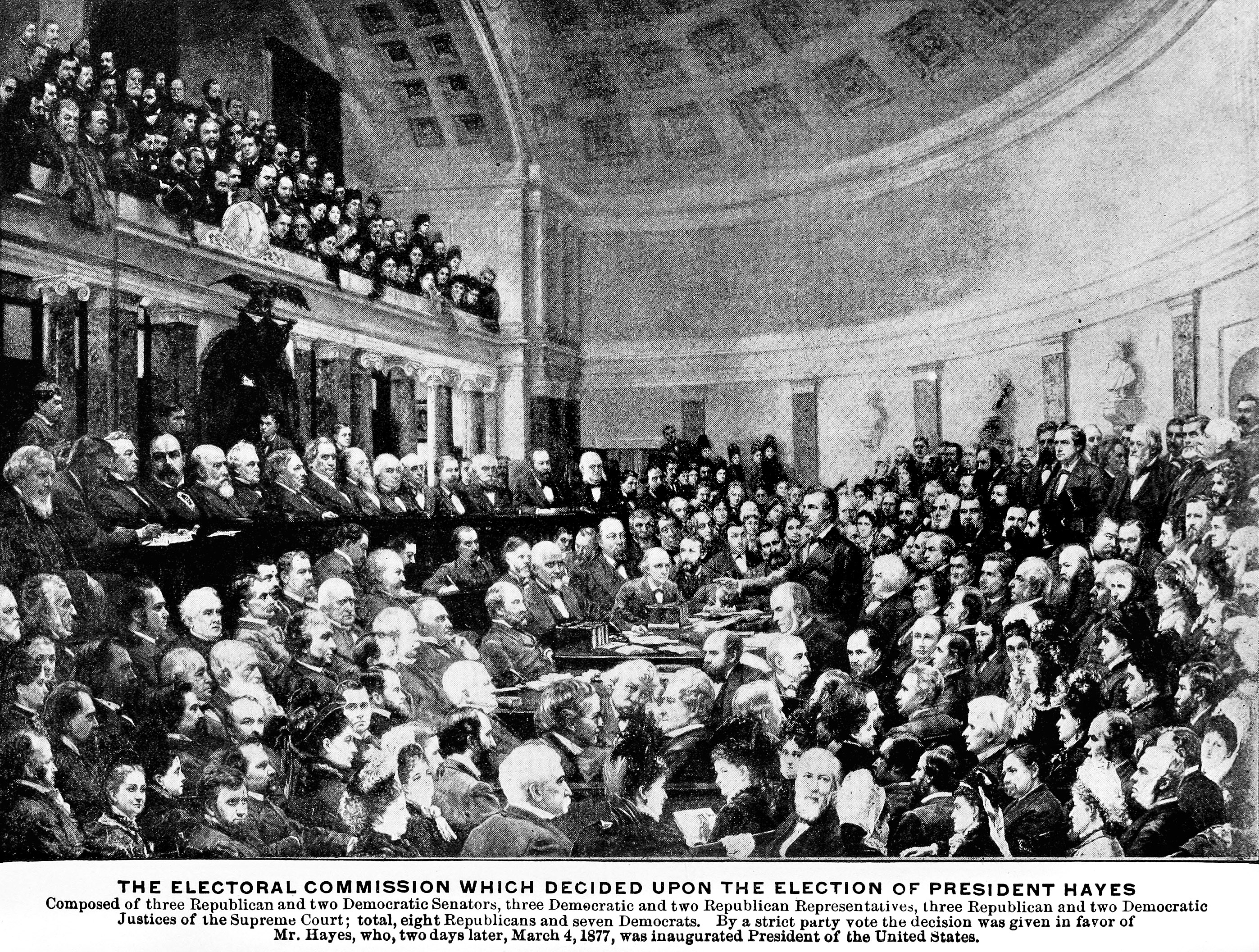The Most Critical Period in the History of Our Country

Composed Of three Republican and two Democratic Senators, three Democratic and two Republican Representatives, three Republican and two Democratic Justices of the Supreme Court; total, eight Republicans and seven Democrats. By a strict party vote the decision was given in favor of Mr. Hayes, who, two days later, March 4, 1877, was inaugurated President of the United States.
Perhaps few will believe what is unquestionably the fact, that the most critical period in the history of our country was not in the Revolution, nor yet in the Civil War, but in the autumn of 1876, or more properly, the opening weeks of 1877. The peril was an appalling one, and the most thoughtful patriots trembled for the safety of their beloved land.
There was nothing specially noteworthy in the political campaign of 1876. The Democratic candidate was Samuel J. Tilden, of New York, one of the ablest men in the Democratic party, and against whose character nothing could be said. His opponent was General Rutherford B. Hayes, of Ohio, who had made a creditable record in the war. Both had served their States as governors, and both were men of unquestioned ability. The campaign was not extraordinarily exciting and was marked by no more than the usual violence of expression. When the vote came to be counted, however, it was found that, outside of several disputed States, each candidate had received about the same number of electoral votes.
Charge of Fraud
Naturally each party charged the other with fraud. In Louisiana the returning board gave the Republican ticket a majority of several thousand by throwing out the returns from several parishes, on the ground of intimidation of voters. The Democrats insisted that these returns should be counted, and had that been done, Tilden would have carried the State.In South Carolina there were two bodies claiming to be the legal Legislature; One gave a plurality to the Republican and the other to the Democratic ticket. The same state of affairs prevailed in Florida, where each claimed a slight majority. Another complication resulted in Oregon, where one of the Republican electors was declared ineligible, because he held the office of postmaster when appointed elector. The critical delicacy of the situation will be understood when it is remembered that if the Republicans secured every point claimed they would have only 185 electoral votes to 184 of the Democrats.
The counter-charges of fraud were repeated with increasing bitterness, and many partisans began talking loudly of seating their candidate by force of arms. Had a collision taken place, it would have been not a war of the North against the South, but of neighbor against neighbor, and heaven only knows what the end would have been.
As if no element of trouble was to be lacking, the Senate was Republican and the House Democratic. The law requires that the electoral vote shall be counted at a joint session of the two Houses, and since double sets of returns were sure to come from four States, the dispute would never end.
The situation was unparalleled. The peril was of the gravest nature. Some plan must be devised or civil war and anarchy were certain. Thoughtful men were alarmed and began to discuss a way out of the danger. Finally, Congress passed the bill creating an electoral commission, to whom all questions in dispute were to be referred, and to whose decision each party would submit.
A Way Out of the Danger
This tribunal consisted of five Senators, appointed by the Vice-President (three Republicans and two Democrats,) five Representatives, appointed by the Speaker (three Democrats and two Republicans,) and five Judges of the Supreme Court (three Repulicans and two Democrats.) The expectation was that Judge David Davis would act as one of the members of the Commission. He was appointed such member, and the body could not have been divided more evenly, for it had seven Democrats, seven Republicans and one Independent in the person of Judge Davis. He was elected United States Senator, however, and Judge Bradley, of New Jersey, took his place on the Commission. Thus constituted, eight Republicans to seven Democrats, every disputed question was decided by that vote in favor of the Republicans, and consequently Rutherford B. Hays became the ninteenth President of the United States.